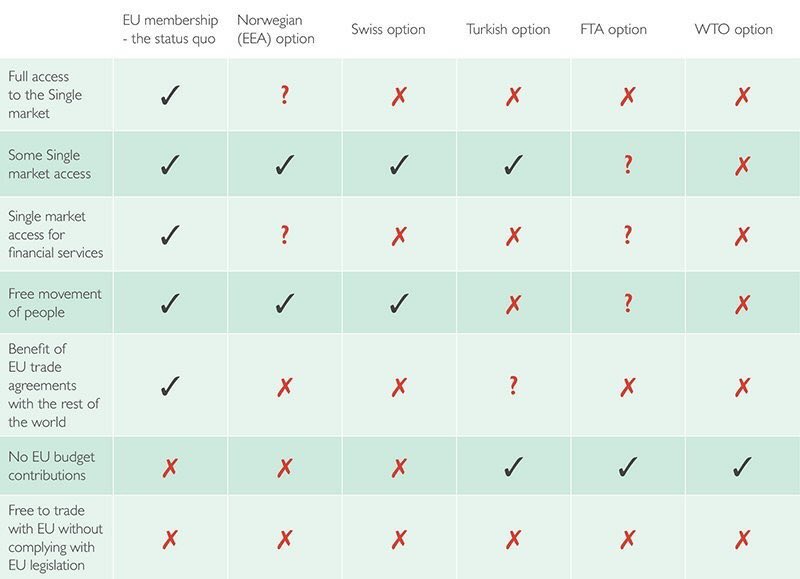What is meant by “Leave” the EU?
One thing that the various Leave campaigners need to be honest about is what do they mean by “leave the EU” as they aren’t at all clear. Instead we hear the same superficial and worn-out arguments for leaving the EU. Voters need to know before we go to the polls, not after and then discover they “got what they wished for” but really don’t like it.
Too many think that there really is a quick and easy way of leaving the EU which keeps our existing trading rights but removes all the unwanted bits of being in the EU. There isn’t an easy BrExit, despite the siren songs of many in the various Leave groups. There are only a set of difficult decisions and tradeoffs. On 2nd March 2016 the UK government published this document with the various options.
Let me put some of the options:
1) Repeal every piece of legislation since the European Communities Act and abrogate every treaty with the EU. If that’s what they mean, then they need to be honest and say that immediately the legal basis for our trade with the EU and all the countries it has free trade agreements with vanishes overnight. Sure, they can be renegotiated but that will take some time and with indeterminate outcomes. Hardly a new nirvana of trade! I’m sure most reasonable BrExiters don’t plan this, but this needs to be included as a baseline for other options.
2) WTO rules only. Well, that means the EU is able to (in fact must) impose tariffs and other barriers on many classes of export (as we must on them). It clearly isn’t in anyone’s interests to do that, but that would happen unless one negotiated a different outcome. On Channel 4 News on 22nd Feb, Nigel Farage said this was the relationship he wanted with the EU.
3) Agree some FTA with the EU. Well, at the point of a referendum we won’t know what the terms of such an FTA might be so we won’t know whether we’re likely to be better or worse off. The experience of EU FTAs with other countries is they remove tariffs on manufactured goods and ease non-tariff barriers but do little or nothing for Service industries.
4) Some deal like Switzerland. Well, the Swiss (having decided to impose immigration caps) are about to find out that they can’t have their cake and eat it. They’ve already been told they won’t qualify for Horizon 2020 funding (something, in its previous forms, the UK has done very well out of).
5) A deal like Norway (or maybe Iceland). Well, this really is obey almost all EU rules but have no say in setting them. Hardly an outcome that will satisfy those who don’t want ” pointless rules and decisions” imposed on them. Indeed, it ensures ” pointless rules and decisions ” are imposed on them without their consent. Norway is also in Schengen so has less control over its borders than we do. Those advocating “Norway” need to explain how they will resolve the “freedom of movement” dilemma. Norway has full access to the EU Single Market (and be subject to its rules) but has to satisfy EU “Rules of Origin” regulations to ensure exports don’t contain components from third party states without an FTA. That’s ok for Norway’s main exports of oil, gas and fish but isn’t for manufactured goods like cars.
Only options 1 and 2 can be taken unilaterally. Any other outcome requires negotiation so we won’t know what we’re voting for. Many in UKIP and the Tory right don’t care about that as they seem prepared to materially harm living standards so they can return to some fictitious nirvana of abstract national sovereignty [in a 21st century globalised world, the idea that any one country can do what it likes without consequences is absurd: every treaty we sign or international body we join concedes some national sovereignty in return for some tangible or intangible benefits]. They should at least be honest and admit it. But promises of some unalloyed nirvana of freedom and sovereignty outside the EU leading to great economic prosperity have no foundation without knowing what the “deal” on offer will be.
Some Leave campaigners argue we can “do better” than Norway, Iceland or Switzerland. They haven’t explained what “better” means nor how they would go about negotiating it. What the EU will also want to avoid is conceding something to Britain that they must then offer to Norway, Switzerland and anyone else with an FTA. The Leave campaign has no consensus on the alternative. Some in the Leave campaign appear to be endorsing the Norway option as a means of claiming formal exit from the EU whilst minimising the economic harm. Some regard this as a staging point on the way to the new nirvana, highlighting the disunity within the various Leave groupings.
All need to explain what would happen if the EU imposes disadvantageous or humiliating terms on the UK. After all, the UK would have voluntarily decided to leave without having agreed exit terms in advance. So, our negotiating position is totally undermined. Telling the EU that the balance of trade is in their favour so they’d be stupid to impose a bad deal is bad negotiations. You should never assume you know what’s best for the other party in a negotiation. It’s like going into a car dealer and presuming their desire to make a sale is greater than their desire to make a profit. It’s no good expecting to get a better price for cash, if their incentive is to sell finance, insurance and maintenance. Post BrExit, the EU’s priority will be maintaining the cohesion and integrity of the remaining members, not protecting a former member from the consequences of their voluntary choice. France won’t care too much about protecting German car exports from British tariffs because they can be sure Brits will still want to buy those cars and won’t take very kindly to their government making it harder and more expensive to do so. But France (and quite a few other EU states) won’t care too much about making Hondas, Toyotas and Nissans more expensive for their citizens, especially if it incents those car makers to relocate to the EU. A work to rule by French customs staff (checking for example the “rules of origin” documentation of UK assembled cars on car transporters at Calais) will make “operation stack” look a walk in the park.
So, the bottom line is there is no “we can have our cake and eat it” option. Anything that doesn’t harm trade and national interest needs negotiating. Once you’ve declared you want to leave, the UK negotiators are at a disadvantage (as we will by then have played the “leave” card) and could be forced to agree humiliating and disadvantageous terms. Those saying the EU wouldn’t do that sound like someone about to divorce his wife and expects her to be reasonable when he walks out on her after 40 years as it’s “clearly in her self interest”. What happens is trivial issues, such as who gets the CD collection, quickly escalate into acrimony on the substantial matters such as who gets the house.
The UK Treasury published a report on the economic costs of these various options on April 18th.
Here’s a graphical summary of the pros and cons of each of the main options.

Below is a more detailed exploration of the issues:

